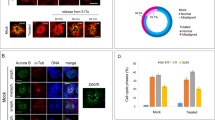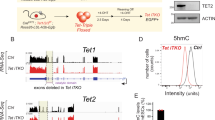Abstract
Several reports have suggested that a defect in the DNA mismatch repair (MMR) system not only causes resistance to methylating agents but also confers low-level resistance to the chemotherapeutic drug cisplatin. Here we report that in a clonogenic assay, mouse embryonic stem (ES) cells deficient for the MMR protein MSH2 respond similarly as wild-type cells to cisplatin. Furthermore, restoring MSH2 expression in a cisplatin-resistant subclone selected from an Msh2−/− cell population did not sensitize cells to cisplatin. To ascertain that our observations were not the result of a mutation in the Msh2−/− cells that obscured the contribution of a defective MMR machinery to cisplatin resistance, we made use of the Cre-lox system to create a cell line in which the Msh2 gene can be conditionally inactivated. However, while de novo inactivation of Msh2 rendered cells tolerant to the methylating drug N-methyl-N′-nitro-N-nitrosoguanidine as expected, it did not alter the sensitivity to cisplatin. In addition, we were not able to derive cisplatin-resistant subclones from this freshly generated MMR-deficient cell line. Thus, in ES cells we did not find evidence for direct involvement of MMR deficiency in cisplatin resistance.
This is a preview of subscription content, access via your institution
Access options
Subscribe to this journal
Receive 50 print issues and online access
$259.00 per year
only $5.18 per issue
Buy this article
- Purchase on Springer Link
- Instant access to full article PDF
Prices may be subject to local taxes which are calculated during checkout




Similar content being viewed by others
References
Aebi S, Kurdi-Haidar B, Gordon R, Cenni B, Zheng H, Fink D, Christen RD, Boland CR, Koi M, Fishel R and Howell SB . (1996). Cancer Res., 56, 3087–3090.
Anthoney DA, McIlwrath AJ, Gallagher WM, Edlin AR and Brown R . (1996). Cancer Res., 56, 1374–1381.
Aquilina G, Ceccotti S, Martinelli S, Soddu S, Crescenzi M, Branch P, Karran P and Bignami M . (2000). Clin. Cancer Res., 6, 671–680.
Branch P, Masson M, Aquilina G, Bignami M and Karran P . (2000). Oncogene, 19, 3138–3145.
Buermeyer AB, Wilson-Van Patten C, Baker SM and Liskay RM . (1999). Cancer Res., 59, 538–541.
Canitrot Y, Cazaux C, Frechet M, Bouayadi K, Lesca C, Salles B and Hoffmann JS . (1998). Proc. Natl. Acad. Sci. USA, 95, 12586–12590.
Claij N and Te Riele H . (2002). Oncogene, 21, 2873–2879.
de Wind N, Dekker M, Berns A, Radman M and Te Riele H . (1995). Cell, 82, 321–330.
de Wind N, Dekker M, van Rossum A, van der Valk M and Te Riele H . (1998). Cancer Res., 58, 248–255.
Drummond JT, Anthoney A, Brown R and Modrich P . (1996). J. Biol. Chem., 271, 19645–19648.
Duckett DR, Drummond JT, Murchie AI, Reardon JT, Sancar A, Lilley DM and Modrich P . (1996). Proc. Natl. Acad. Sci. USA, 93, 6443–6447.
Durant ST, Morris MM, Illand M, McKay HJ, McCormick C, Hirst GL, Borts RH and Brown R . (1999). Curr. Biol., 9, 51–54.
Fink D, Nebel S, Aebi S, Zheng H, Cenni B, Nehme A, Christen RD and Howell SB . (1996). Cancer Res., 56, 4881–4886.
Fink D, Nebel S, Norris PS, Aebi S, Kim HK, Haas M and Howell SB . (1998). Br. J. Cancer, 77, 703–708.
Fink D, Zheng H, Nebel S, Norris PS, Aebi S, Lin TP, Nehme A, Christen RD, Haas M, MacLeod CL and Howell SB . (1997). Cancer Res., 57, 1841–1845.
Gong JG, Costanzo A, Yang HQ, Melino G, Kaelin Jr WG, Levrero M and Wang JY . (1999). Nature, 399, 806–809.
Hawn MT, Umar A, Carethers JM, Marra G, Kunkel TA, Boland CR and Koi M . (1995). Cancer Res., 55, 3721–3725.
Kartalou M and Essigmann JM . (2001). Mutat. Res., 478, 23–43.
Koi M, Umar A, Chauhan DP, Cherian SP, Carethers JM, Kunkel TA and Boland CR . (1994). Cancer Res., 54, 4308–4312.
Lan Z, Sever-Chroneos Z, Strobeck MW, Park CH, Baskaran R, Edelmann W, Leone G and Knudsen ES . (2002). J. Biol. Chem., 277, 8372–8381.
Mamenta EL, Poma EE, Kaufmann WK, Delmastro DA, Grady HL and Chaney SG . (1994). Cancer Res., 54, 3500–3505.
Massey A, Offman J, Macpherson P and Karran P . (2003). DNA Repair, 2, 73–89.
Mello JA, Acharya S, Fishel R and Essigmann JM . (1996). Chem. Biol., 3, 579–589.
Mu D, Tursun M, Duckett DR, Drummond JT, Modrich P and Sancar A . (1997). Mol. Cell. Biol., 17, 760–769.
Nehme A, Baskaran R, Aebi S, Fink D, Nebel S, Cenni B, Wang JY, Howell SB and Christen RD . (1997). Cancer Res., 57, 3253–3257.
Risinger JI, Umar A, Barrett JC and Kunkel TA . (1995). J. Biol. Chem., 270, 18183–18186.
Samimi G, Fink D, Varki NM, Husain A, Hoskins WJ, Alberts DS and Howell SB . (2000). Clin. Cancer Res., 6, 1415–1421.
Sansom OJ and Clarke AR . (2002). Oncogene, 21, 5934–5939.
Sergent C, Franco N, Chapusot C, Lizard-Nacol S, Isambert N, Correia M and Chauffert B . (2002). Cancer Chemother. Pharmacol., 49, 445–452.
Siddik ZH, Mims B, Lozano G and Thai G . (1998). Cancer Res., 58, 698–703.
Strathdee G, Sansom OJ, Sim A, Clarke AR and Brown R . (2001). Oncogene, 20, 1923–1927.
Swann PF, Waters TR, Moulton DC, Xu Y-Z, Zheng Q, Edwards M and Mace R . (1996). Science, 273, 1109–1111.
Taniguchi M, Sanbo M, Watanabe S, Naruse I, Mishina M and Yagi T . (1998). Nucleic Acids Res., 26, 679–680.
Vaisman A, Varchenko M, Umar A, Kunkel TA, Risinger JI, Barrett JC, Hamilton TC and Chaney SG . (1998). Cancer Res., 58, 3579–3585.
Watanabe Y, Koi M, Hemmi H, Hoshai H and Noda K . (2001). Br. J. Cancer, 85, 1064–1069.
Yamada M, O'Regan E, Brown R and Karran P . (1997). Nucleic Acids Res., 25, 491–495.
Zhukovskaya N, Branch P, Aquilina G and Karran P . (1994). Carcinogenesis, 15, 2189–2194.
Acknowledgements
We thank Judith Martens for cloning the loxP site downstream of exon 13, Valerie Doodeman and Yvonne van Klink for technical assistance, Jos Jonkers for providing us with CMV-Cre, loxP and floxed Neo plasmids, R Moschel for the gift of O6-benzylguanine, and Marjolein Sonneveld for helpful comments on the manuscript. We acknowledge support from the Dutch Cancer Society (Grant NKI 98-1838) and the European Committee (Grant ENV4-CT97-0469).
Author information
Authors and Affiliations
Corresponding author
Rights and permissions
About this article
Cite this article
Claij, N., te Riele, H. Msh2 deficiency does not contribute to cisplatin resistance in mouse embryonic stem cells. Oncogene 23, 260–266 (2004). https://doi.org/10.1038/sj.onc.1207015
Received:
Revised:
Accepted:
Published:
Issue Date:
DOI: https://doi.org/10.1038/sj.onc.1207015
Keywords
This article is cited by
-
Mouse embryonic stem cells are hypersensitive to apoptosis triggered by the DNA damage O6-methylguanine due to high E2F1 regulated mismatch repair
Cell Death & Differentiation (2007)
-
Cellular processing of platinum anticancer drugs
Nature Reviews Drug Discovery (2005)



